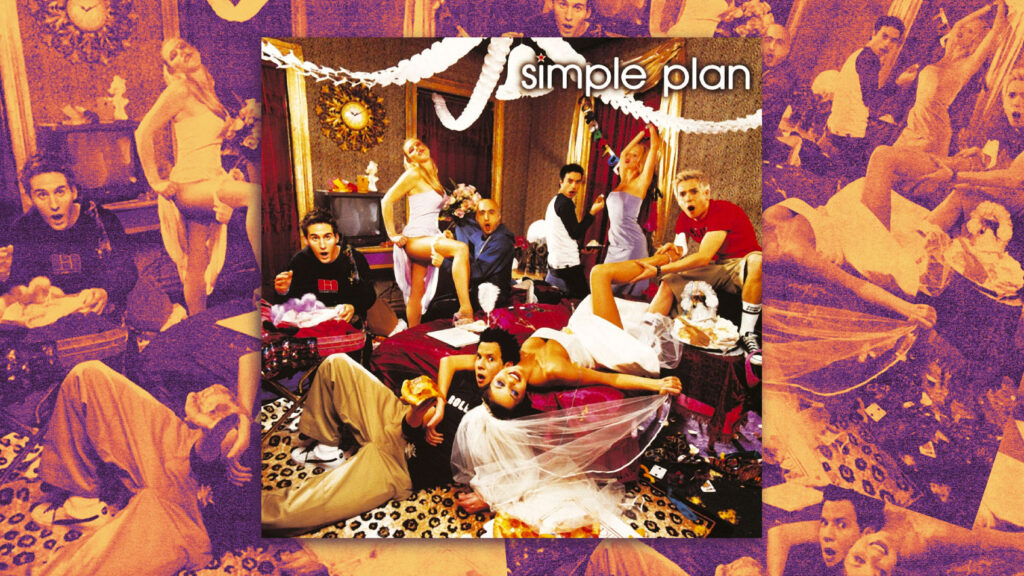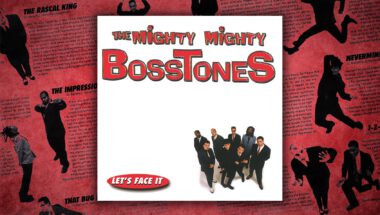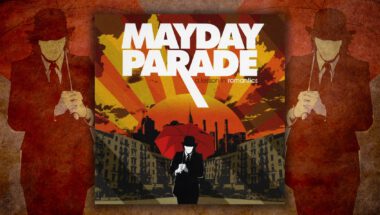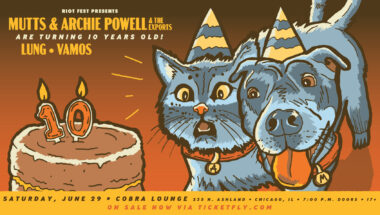On March 19, Simple Plan’s debut studio album No Pads, No Helmets…Just Balls celebrated its 20th anniversary. The album features many of the band’s better-known hits, including “I’m Just a Kid,” “Perfect,” “Addicted,” and “I’d Do Anything.”
This month, Simple Plan will return to Chicago to play a set of their classic pop punk anthems mixed with new songs from their upcoming release, Harder Than It Looks. Riot Fest talked to Simple Plan vocalist Pierre Bouvier about how some of the band’s first songs have taken on a new meaning for him as a father; addressing and dealing with life’s turmoils through music; and his excitement to join co-headliners Sum 41 on stage at Radius on May 15.
RIOT FEST: Congrats on reaching 20 years of No Pads, No Helmets…Just Balls. How does it feel?
PIERRE BOUVIER: It feels a little weird because as I’m getting a little bit older, time seems to be going in a fast forward motion. I look at that number—20 years—and I think ‘Wow, that’s so cool… but wait a minute, it doesn’t feel like it’s been 20 years.’ It’s bizarre because when you’re younger, you think that when you get to these milestones you’re gonna feel like a different person. You grew up with your authority figures—whether it’s your parents, your teachers, or grandparents—and thought, ‘Oh, those people have always been old.’ But I still feel like the same guy that was singing “I’m Just a Kid” 20 years ago.
At the same time, there’s a big sense of accomplishment because we’re still a band, we’re still touring, we still have a good fan base, and I would consider us to be fairly relevant, without being boastful. It’s a mix of emotions; I can’t believe it’s gone by so fast.
Some of the standout songs on that album are still staples on your setlists. Do those songs still resonate with you the same way they did 20 years ago?
“I’m Just A Kid,” even at the time it was written, was always a bit tongue-in-cheek. We were using the imagery of, ‘I’m in my room all alone, I have no friends,’ which is obviously a caricature to describe feeling out of place. That still resonates because it wasn’t necessarily meant to be taken literally, it was meant to be taken as a general idea like, ‘damn, I feel like I’m just a kid and life’s a nightmare, and everything feels so dramatic.’
I think a lot of the songs have taken on a new sort of meaning, too. The song “Perfect”, which was a direct message to our parents at the time saying ‘Hey, I’m sorry I’m not going to become a dentist or something that is safe, and makes some money. I’m going to be in a band and I’m gonna quit school, hop in a van and play shows around the world. Realistically, it probably won’t make any money.’ But obviously, things have changed, we got lucky, and I think that our work paid off.
My parents always supported us in the band. I think they were always concerned and would have been more at ease if we had done something that was a little bit more of a safe path. However, my dad drove us on one of our first tours with Sugar Ray. We were about to rent a van and pull a trailer as everybody else does, and my dad said ‘Screw that! You guys are hopping in my RV.’
That song has a new meaning for me because now I have kids, and I think of the impact that those words may have had on our parents. When you have your own kids, everything becomes a little more clear. The song takes on a whole new meaning and it makes me want to make sure I tell my kids that they are perfect, no matter what they want to do. My youngest daughter really wants to be a rockstar. She’s very young—eight years old—so that might change, but if she decides to go down that path, I’m not going to stop her, because I think that would hinder my relationship with her. You want to support your kids and you want them to feel like they have a friend in you, but you also have to educate them with the right decisions; there’s a balance there. My goal is to try to be the right balance and to try to steer them in the right direction, and obviously show them as much support as possible.
Some of those songs still resonate in a different way; some are still the same. We still play a lot of those songs in the setlist because we realize the impact of that album had on a lot of people growing up. We don’t want to be a band that you go to see and we don’t play the old, classic songs (even though we play some new stuff as well.) We want to give people what they want to hear, and a lot of times it happens to be the old songs they fell in love with, and that’s not a problem for us.
Your first record took several years to write and record, which isn’t the normal experience for many other pop punk bands. Can you talk about how the band approached creating No Pads?
We put our money together and rented this little studio in Montreal, and started recording some demos on our own. From there, we landed a management deal with Coalition Music in Toronto, who we still have as managers, and they helped us hook up with a producer. The whole process was lengthy, from the demo phase, playing some shows, getting into the studio, fine tuning those demos with a producer, and writing more songs. When we got signed, we took all those demos and re-recorded them into a final, proper master. By the time they came out, some of those songs were already two or three years old in our catalog. “I’d Do Anything” was one of the songs that we wrote when we first got together and by the time it came out, it would have been almost three years old.
Chuck [Comeau] and I had a band called Reset that started in 1993. We’ve played together since we were 13 years old. We made two albums, toured across Canada, signed to an indie label, and opened up for bands like Face to Face, Pennywise, and NOFX—we even played alongside Blink-182 before they were big. We knew how to be in a band, travel in a van, and play to up to 300 people a night. By 1999, Blink-182 had released Enema of State and they were blowing up, and Green Day was massive already. We wanted to be in a band that was going to do more than just play these crappy clubs—those are fun, and it was a fun education, but we had more ambition than that. When we put Simple Plan together, we didn’t want to grind in every club again. We needed to get signed to a major label, because at the time, there was no MySpace, Facebook, Instagram, TikTok. The only way you could reach people was to get into the machine of major labels and get pushed to the radio.
We really focused on making this album amazing—we couldn’t mess around. There were a lot of hurdles along the way—a lot of denials and let-downs from labels who weren’t interested in the pop punk sound they thought was about to die. Finally, Lava Records, which was a small division of Atlantic Records in New York, signed us, and that was how it started. Our beginnings were not the typical beginnings of a bunch of young guys getting together, because we had already sort of done those steps in our previous band.
Do you feel your mindset or approach to recording has changed from the professional and strategic way you approached No Pads?
It’s been 20+ years, and if you count our other band, I’ve been playing with some of these guys for over 25 years and our mindset really hasn’t changed a whole lot. For our first couple albums with Simple Plan back in the day, the recording technology and process was more confined to actual studios; you needed a big studio to make the record. Now, we have the ability to write little parts here and there because I have a studio at my house and Sébastien [Lefebvre] has a studio at his house. It’s nice because we’re trying to save money, but also not feel as bad about taking more time. When you’re in a studio and you’re paying $3,000 a day, if you don’t accomplish something that day, you’re going to feel that financial loss. If we team up and do some of it at my house, we can experiment, be creative, and not spend money. That’s the only difference really; other than that, our mindset’s been the same.
I feel like I’m still the same guy trying to write the best songs that I can possibly come up with. I’m always trying to make awesome melodies and lyrics that will mean something to people. More than ever, we’re trying to lean into the fact that for a lot of our fans and even general pop punk fans, this type of music can be a lifeline when you’re going through tough times. We’re trying to consciously write songs that are going to be there for people.
Since you started the first record with such a professional mindset, has your approach towards writing and recording changed at all over the years?
Now, I can put together something that sounds really, really close to a Simple Plan record on my own. That’s a process that we’ve done since our second album. In 2004, I bought myself a good laptop and studio monitors, and taught myself to produce. I can play the keys, I play the guitar, bass, and drums, so if we ever had any cool ideas, I’m able to mock it up pretty well. It’s definitely a fun part of the process because I don’t just take an idea on an acoustic guitar and a little phone with a voice note, I can really map it out and try different things. It’s a modest studio. There’s not much here, but it’s enough to be creative. I started having a dedicated space for that in the last 10 years or so. It’s been really helpful for my creative side.
Chuck and I have always been the main writers in the band. He does a lot of the lyrical concepts, and then we get together and flush it out. I usually record all these demos in my house, then we send them to the rest of the band and we weed through the good stuff, the bad stuff and, and widdle ourselves a record.
Your next record, Harder Than It Looks, comes out May 6. What can you tell fans about the themes and sound of this new album?
One of the main themes of the record is going through difficult parts of your life. We’ve all lived through a lot of things, whether it’s a lot of heartbreaks or just challenging times. If you listen to ‘I’m just a kid and life’s a nightmare,’ or ‘I’m sorry, I can’t be perfect,’ there’s so much internal turmoil in those songs. When you’re younger, you look at people in their 30’s and 40’s and you think that these people don’t have those concerns, they don’t have insecurities, they don’t have anxieties. But as you get there, you realize that sometimes it can be even more intense as an adult. The record’s about where we are now.
There’s a few songs about relationships that I feel I can really relate to when it comes to my wife and my kids, like “A Million Pictures of You,” which is about being obsessed with the person you’re in love with and just feeling like you just want to be with them all the time and take pictures and just stare at them because you’re super in love. Then there’s “The Antidote.” There were so many times in my life where my wife has always been there to ground me and bring me back to reality. I don’t know if I have a specific anxiety disorder or if it’s just the regular anxiety that we all feel, but I’ve had multiple panic attacks and anxiety attacks where I’m in a hotel room, I can’t fall asleep, and I don’t know what’s going on, my heart’s pumping, and I’m losing my mind. I just call my wife and she talks to me for a few hours and talks me off the edge, so to speak.
There’s been a couple of episodes in my life when panic attacks started happening, and I didn’t know what they were and for whoever out there has experienced them, it’s a very bizarre thing that happens and you feel helpless; it’s really kind of freaky. “Anxiety” is a song that is meant to be a description of what I felt like when I was getting those panic attacks. It starts with “the pressure comes, I can feel it now. I’m just another tragic case of…” It’s also about what makes you feel anxious.
Then there’s “Iconic,” which is about being in this band and trying to overcome all challenges. When you’re trying to do anything unique, there’s going to be a lot of naysayers out there, and we still deal with that today. I’m insecure; I never feel like I’m good enough, like I’ve done what I wanted to do. I rarely feel fully proud of myself, but I’ve got to remind myself I’m gonna be great. I’m gonna push myself to the limit, and I won’t listen to any negative outside influence.
For me, the song “Ruin My Life” is about not listening to online “trolls” who have nothing better to do than shit on people online. You would think that people who have had a lot of success would look at those negative comments and not care; ‘I’m laughing all the way to the bank’, or whatever you want to call it. I’m not a big celebrity or anything, but those comments really affect me and it takes a moment of re-centering and focusing on the present to let that stuff go. That song is about thinking, ‘I shouldn’t let you in my head, I shouldn’t have let you creep in.’ Into the chorus, you reassure yourself and say, ‘you almost got me, but you didn’t ruin my life.’
Let’s talk about the tour: will the setlist be more directed at promoting the new album, or towards celebrating No Pads?
It’s still a work in progress. We did an anniversary tour for No Pads, No Helmets…Just Balls at 15 years. Those ticket sales were much higher than our usual tours, so we just assumed that people do like those [anniversary sets]. We understand the whole thing about nostalgia, and we do want to celebrate this milestone, even though it didn’t seem that long ago. Every show we play “I’d Do Anything,” “Addicted,” “Perfect,” and “I’m Just a Kid,” but I think we’re gonna play almost the entire first album. Then, we have about 40 minutes to play different hits from different eras and different different albums, along with the songs that we’ve seen more streaming from, just because I assume that’s what people want to hear.
I’m a little bit torn because I feel like if I’m gonna go see a band that’s been around for 20 years, I do want to see a lot of old stuff, but maybe some fans want to hear the whole new album—though I doubt that. I think there’s more people that want a nice balance of old classic songs, the ones you’ve learned to love over the years, sprinkled with a few new ones. We’re gonna try to balance it out and sort of play it by ear. If people want to hear more new ones, then we’ll just shave off the ones off No Pads that don’t seem that important, that weren’t life changing.
Are there any specific aspects of the tour you’re especially excited for?
I’m expecting the reaction to “I’m Just A Kid” to be even better than it used to be. It’s always a staple in our set, a song that people know us for, but it’s funny to touch on the phenomenon that happened 20 years later with “I’m Just A Kid” and TikTok.
We had no part in making that happen. It was purely organic. I didn’t even know what the hell TikTok was. The whole challenge was really cool and wholesome. To go through that hashtag during the pandemic, it was actually heartwarming. The song is up 100 millions spins on Spotify over the last two years, so I think the fans’ reaction will be even better than it used to be.
You can catch Simple Plan co-headlining with Sum 41 at Radius Chicago on Sunday, May 15 (with special guests Set It Off). 640 W. Cermak Rd. 17+, 6:00 p.m.; get your tickets here.



